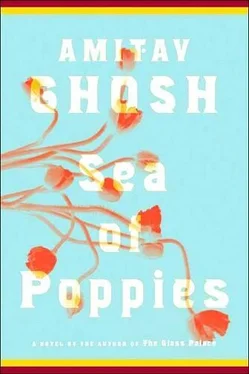After a year spent in rural seclusion, it made his spirits soar to hear these harbour-front voices again, with their outpourings of obscenity and abuse, taunts and invitations – and to watch the lascars swinging through the ringeen made his own hands grow restless for the feel of rope. As for the nearby shore, his gaze kept straying from the godowns and bankshalls of Kidderpore, to the twisting lanes of Watgunge where the women sat on the steps of their kothis, painting their faces in preparation for the night. What would they say to him now, those women who'd laughed and turned him away because of his youth?
Beyond Mr Kyd's shipyard, the traffic on the water thinned a little, and Jodu had no difficulty in pulling up to the embankment at Bhutghat. This part of the city lay directly opposite the Royal Botanical Gardens, on the far side of the Hooghly, and the ghat was much used by the Gardens' staff. Jodu knew that one of their boats would pull up here sooner or later, and sure enough, one such appeared within the hour, carrying a young English assistant curator. The lungi-clad coksen at the helm was well-known to Jodu, and once the sahib had stepped off, he pushed his own boat closer.
The coksen recognized him at once: Arré Jodu na? Isn't that you – Jodu Naskar?
Jodu made his salams: Salam, khalaji. Yes, it's me.
But where have you been? the coksen asked. Where's your mother? It's more than a year since you left the Gardens. Everyone's been wondering…
We went back to the village, khalaji, said Jodu. My mother didn't want to stay on after our sahib died.
I heard, said the coksen. And there was some talk that she was ill?
Jodu nodded, lowering his head: She died last night, khalaji.
Allah'r rahem! The coksen shut his eyes and muttered: God's mercy on her.
Bismillah … Jodu murmured the prayer after him and then added: Listen, khalaji – it's for my mother that I'm here: before she died she told me to be sure to find Lambert-sahib's daughter – Miss Paulette.
Of course, said the coksen. That girl was like a daughter to your mother: no ayah ever gave a child as much love as she did.
… But do you know where Paulette-missy is? It's more than a year since I last saw her.
The coksen nodded and raised a hand to point downriver: She lives not far from here. After her father died she was taken in by a rich English family. To find her, you'll have to go to Garden Reach. Ask for the mansion of Burnham-sahib: in the garden there's a chabutra with a green roof. You'll know it the moment you see it.
Jodu was delighted to have achieved his end with such little effort. Khoda-hafej khálaji! Waving his thanks, he pulled his oar from the mud and gave it a vigorous heave. As he was pulling away, he heard the coksen talking excitedly to the men around him: Do you see that boy's dinghy? Miss Paulette – the daughter of Lambert-sahib, the Frenchman – she was born in it: in that very boat…
Jodu had heard the story so many times, told by so many people, that it was almost as if he had witnessed the events himself. It was his kismat, his mother had always said, that accounted for the strange turn in their family's fate – if she hadn't gone home to her own village for Jodu's birth, it was certain that their lives would never have embraced Paulette.
It had happened soon after Jodu was born: his boatman father had come in his dinghy to fetch his wife and child from her parents' home, where she had gone for the delivery. They were on the Hooghly River when a brisk, squally wind had started to blow. With the day nearing its end, Jodu's father had decided that he would not risk crossing the river at that time: it would be safer to spend the night by the shore and make another attempt the next morning. Keeping to the bank, the boat had arrived eventually at the brick-bound embankment of the Royal Botanical Gardens: what better resting-place could there be than this fine ghat? Here, with the boat safely moored, they had eaten their evening meal and settled in to wait out the night.
They had not been long asleep when they were woken by a clamour of voices. A lantern had appeared, bringing with it the face of a white man: the sahib had thrust his face under their boat's thatched hood and uttered many words of frantic gibberish. It was clear he was very worried about something, so they were not surprised when one of his servants intervened to explain that there was a dire emergency; the sahib's pregnant wife was in great pain and in desperate need of a white doctor; there were none to be had on this side of the river, so she had to be taken to Calcutta, on the other bank.
Jodu's father had protested that his boat was too small to attempt a crossing, with no moon above, and the water churning beneath shifting winds. Far better that the sahib take a big bora or a budgerow – some boat with a large crew and many oars; surely there were some such at the Botanical Gardens?
So there were, came the answer; the Garden did indeed have a small fleet of its own. But as luck would have it, none of those boats were available that night: the head curator had commandeered them all, in order to take a party of his friends to the annual Ball of the Calcutta Exchange. The dinghy was the only boat presently moored at the ghat: if they refused to go, two lives would be lost – the mother's as well as the child's.
Having herself recently suffered the pains of childbirth, Jodu's mother was touched by the evident distress of the sahib and his mem: she added her voice to theirs, pleading with her husband to accept the commission. But he continued to shake his head, relenting only after the handing over of a coin, a silver tical worth more than the value of the dinghy itself. With this unrefusable inducement the bargain was sealed and the Frenchwoman was carried on board, in her litter.
One look at the pregnant woman's face was enough to know that she was in great pain: they cast off at once, steering towards Calcutta 's Babughat. Even though it was windy and dark, there was no difficulty in setting a course because the lights of the Calcutta Exchange had been especially illuminated for the annual Ball and were clearly visible across the river. But the winds grew stronger and the water rougher as they pulled away from the shore; soon the boat was being buffeted with such violence that it became difficult to hold the litter still. As the rolling and tossing increased, the memsahib's condition grew steadily worse until suddenly, right in midstream, her waters broke and she went into the throes of a premature labour.
They turned back at once, but the shore was a long way off. The sahib's attention was now focused on comforting his wife and he could be of no help in the delivery: it was Jodu's mother who bit through the cord and wiped the blood from the girl's tiny body. Leaving her own child, Jodu, to lie naked in the boat's bilges, she took his blanket, wrapped the girl in it, and held her close to her dying mother. The child's face was the last sight the memsahib's eyes beheld: she bled to death before they could return to the Botanical Gardens.
The sahib, distraught and grieving, was in no position to deal with a screaming infant: he was greatly relieved when Jodu's mother quietened the baby by putting her to her breast. On their return, he made another request – could the boatman and his family stay on until an ayah or wet-nurse could be engaged?
What could they say but yes? The truth was that Jodu's mother would have found it hard to part from the girl after that first night: she had opened her heart to the baby the moment she held her to her breast. From that day on, it was as if she had not one child but two: Jodu, her son, and her daughter Putli – 'doll' – which was her way of domesticating the girl's name. As for Paulette, in the confusion of tongues that was to characterize her upbringing, her nurse became Tantima – 'aunt-mother'.
Читать дальше












